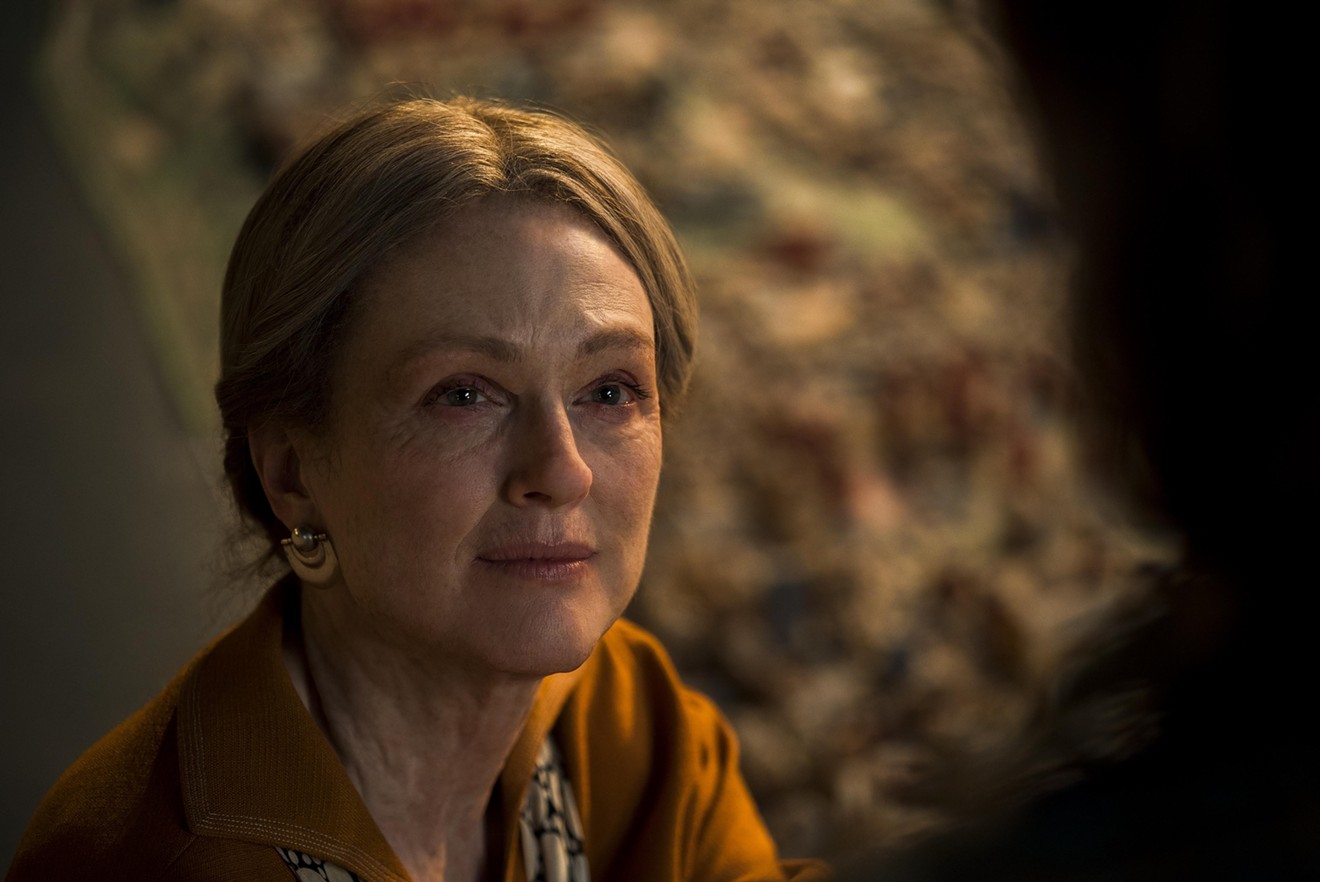Last year’s Cannes Festival seemed to be all about the past, trauma, and the persistence of memory. It’s too early in this year’s festival to suss out any broad themes, but the one-two punch of Todd Haynes’s Wonderstruck and Andrey Zvyagintsev’s Loveless, the first two Official Competition titles to screen, have placed the themes of childhood and generational passage in the spotlight. And yet it’s also hard to think of how the works could be more different. That fact too feels pertinent: The contrasts between the brooding Russian drama and the trippy, maximalist American coming-of-age film seem to say something about the times we live in, even though both are set in the past.
An adaptation of a young adult novel by Brian Selznick (who also wrote the book that inspired Martin Scorsese’s Hugo), Haynes’s film follows two timelines: In one, 12-year-old Ben (Oakes Fegley), living in small-town Minnesota in 1977 and mourning the death of his librarian mother (Michelle Williams), finds a stray bookmark that may hold a clue to the identity of the father he never knew. Rendered deaf by a lightning strike (no, really), and feeling more and more like an outcast, Ben hops a bus bound for New York City. Intercut with his story is that of Rose (Millicent Simmonds), a deaf girl living in Hoboken in 1927 and obsessed with a silent movie star (Julianne Moore). Frustrated with her sheltered life and her domineering father, she too heads to the city, where she hopes to find this mysterious woman.
There are few directors better than Haynes at adopting varied voices and vernaculars and then blending them to create something intoxicating and new. As these kids discover New York in their own ways, Wonderstruck switches between the silent-film aesthetics of Rose's journey (no dialogue, striking angles, bold emotions) and the Seventies stylizations of Ben's (zooms, fast-cutting, handheld shots, tight close-ups). But the intercutting isn't clean – the styles sometimes mix and riff on each other. For lengthy stretches the film plays like a city symphony, the kids’ silent movements are accompanied by Carter Burwell's dominant score, bouncing from elegant orchestrations to funk fuzz to melodic drones.
It’s all clearly building up to something: Key characters are briefly abandoned, storylines are cut short, random details are held onto for a little longer than anticipated. I did wonder at times if the denouement would ever do justice to the ever-shifting, jazzy zigzag of the tease. I needn't have worried: Haynes gives us an extended finale that not only offers emotional payoff to the held-breath anticipation of the story, but also serves as a tribute to storytelling itself – and to the wonders of following your dreams and maybe even your nightmares.
I'm told that Wonderstruck hews pretty close to its source material, which makes it all the more startling that the film seems so personal. Both of these kids are enacting variations on the same, self-actualizing journeys of obsession so many people – creative and otherwise – have taken. I'd love to screen this film alongside Haynes's Velvet Goldmine, another nakedly heartfelt work about finding your circle and your passion, and all the struggles that come with discovering (and holding onto) your place in the world.
There is so, so much packed in here; Wonderstruck is simultaneously the densest and loosest film Haynes has made. And, like many stories based on books for children, much of it makes more emotional than logical sense. I was wowed by pretty much all of it, but the moment that most resonates – the one that seems to embody the whole movie – comes early on, as Rose stands on a boat headed to Manhattan, holding a newspaper clipping about the actress she’s searching for. Suddenly, the wind rips it from her hand, and for a fevered instant, Rose runs and jumps around the deck trying to retrieve it. Haynes holds on her frantic scrambling for a surprisingly long time – the sight of an obsessed girl, unwilling to give in or give up on her restless, fleeting dream.
Two representative moments also define Zvyagintsev’s Loveless – and they are among the most devastating, harrowing things I’ve ever seen on a screen. I won’t spoil what they are, as one relies on the element of surprise and the other happens quite late. But their raw emotionalism both complicates and deepens Zvyagintsev’s film, which hovers between personal drama and deep political allegory.
The story concerns a family that maybe should never have existed: Alexei (Matvey Novikov) is a 12-year-old boy whose bitter, distracted parents Boris (Alexey Rozin) and Zhenya (Maryana Spivak) are in the midst of a slow-rolling divorce. They’ve both got new partners – she’s found a wealthy, older businessman, and he’s found a young, traditional woman whom he’s already gotten pregnant. The parents’ almost violent disregard for their son is the stuff of fairy tale villains: Late one night, Zhenya openly talks of sending the boy to an orphanage once the divorce is finalized. Boris must object: He works for a powerful, deeply religious businessman who insists his employees all have families. (In one of the film’s few comic scenes, a co-worker tells Boris about the time one colleague hired a fake wife and child for a company get-together.)
Soon, however, Alexei goes missing, and father and mother go from inattention to irritation to anguish. The bulk of the film concerns the methodical search of the surrounding areas: The police, like most institutions in Zvyagintsev’s world, are useless, so instead the parents are helped by a group of highly organized grassroots volunteers. The hunt takes them through apartment blocks, dense forests, abandoned wastelands, and, most notably, a decaying Soviet era complex that once housed conference rooms, a movie theater, and a basketball court – a massive, decrepit building that looks at times like it came right out of Tarkovsky’s Stalker.
Loveless works on a base emotional level – dear God, how it works on that level – but there’s something else going on here: The year is 2012 (which would make Alexei the same age as Putin’s Russia) and radios and TVs constantly blare reports about the war in Ukraine. Overt statements and symbols of piety are everywhere, but so are the signs of both out-of-control capitalism and institutional decay. The men are mostly driven, ambitious, cold. The women, even the ones in the background, veer between narcissism and desperation; they’re all selfies and mating calls. We glimpse a woman in a restaurant flirtatiously gives her number to a voice behind the camera before sitting back down with her date.
What the hell is going on here, you might ask. How does it connect to the story we’re being told? The director seems to be in pursuit of a broader tapestry: The Russia Zvyagintsev presents is a wasteland of survival, where a woman’s only hope is pairing off with a moneyed man. That, of course, is also how Boris and Zhenya wound up in this situation: At one point, she confesses that she never intended to get pregnant, and wanted an abortion.
But it goes farther than that: Watching these vast, cavernous spaces, these huge buildings and dead fields, these buzzing interactions where everything seems geared towards pairing off, we start to wonder how one boy could ever be found. Late in the film, a flyer placed on a lamp post is first ignored by one person, then read and disregarded by another. We then see some more flyers, seen from a distance, dwarfed by the buildings around them. If Wonderstruck was a movie all about an individual daring to escape out into the big scary world to find him or herself, Loveless is its exact opposite: a portrait of a huge, heartless world where solitary souls are not allowed to exist.
[
{
"name": "Air - MediumRectangle - Inline Content - Mobile Display Size",
"component": "18478561",
"insertPoint": "2",
"requiredCountToDisplay": "2"
},{
"name": "Editor Picks",
"component": "16759093",
"insertPoint": "4",
"requiredCountToDisplay": "1"
},{
"name": "Inline Links",
"component": "17980324",
"insertPoint": "8th",
"startingPoint": 8,
"requiredCountToDisplay": "7",
"maxInsertions": 25
},{
"name": "Air - MediumRectangle - Combo - Inline Content",
"component": "16759092",
"insertPoint": "8th",
"startingPoint": 8,
"requiredCountToDisplay": "7",
"maxInsertions": 25
},{
"name": "Inline Links",
"component": "17980324",
"insertPoint": "8th",
"startingPoint": 12,
"requiredCountToDisplay": "11",
"maxInsertions": 24
},{
"name": "Air - Leaderboard Tower - Combo - Inline Content",
"component": "16759094",
"insertPoint": "8th",
"startingPoint": 12,
"requiredCountToDisplay": "11",
"maxInsertions": 24
}
]












